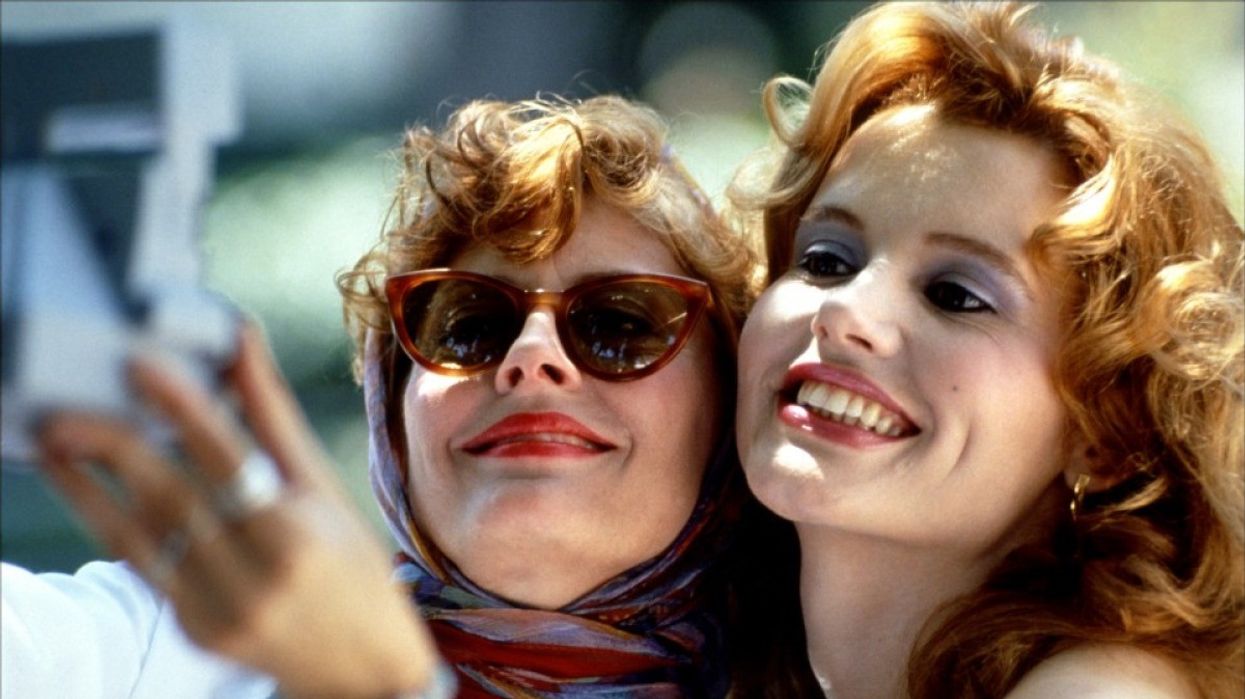This Is Why 'Thelma & Louise' Didn’t Change Hollywood
Even after 30 years, Thelma & Louise still strikes up an interesting conversation amongst audiences.

It’s been 30 years since Ridley Scott’s Thelma & Louise hit the screen. This 1991 film became a landmark in feminist filmmaking by showcasing women taking action and creating a better world to live in, even if that meant fleeing in their 1966 Thunderbird from the cops.
Geena Davis, who played Thelma in the film, said the press predicted it would be a huge hit that could change everything in Hollywood before its release.
And then, nothing.
Well, not nothing, really, but not what anyone was expecting. Although the film received six Academy Award nominations and helped boost Geena Davis, Susan Sarandon, and writer Callie Khouri to a new level in Hollywood, the film was met with negative reviews. The three women shared their responses to the negative critiques during a Q&A while attending a special 30th-anniversary drive-in screening event at Los Angeles’ Greek Theatre, moderated by The Hollywood Reporter’s Rebecca Keegan.
Thelma & Louise is very much like Butch Cassidy and the Sundance Kid—criminals on the run from the law after committing a crime—multiple crimes in Butch Cassidy’s case. It’s a fun “lets-run-from-the-cops” movie that allows us the fantasy of living the life we want while on the road with our favorite companion.
But the fun of Thelma & Louise ended for many of the critics as soon as Thelma pointed the .38-caliber pistol.

Callie Khouri name-checked a critic—U.S. News & World Report’s John Leo—who called the film neo-fascist.
Sarandon, who plays Louise in the film, followed up on that comment by mentioning her surprise at the film’s poor reception. “I completely underestimated that we were backing into territory held by white heterosexual males. They got offended and accused us of glorifying murder and suicide and all kinds of things.”
For Thelma & Louise, an act of self-defense against a man who attempted to rape Louise and a few petty crimes landed the two women in hot water with a few critics. As one critic put in the Los Angeles Times, “When women have been allowed to demonstrate grit and physical courage, it is usually in crypto-male action roles... but there’s something closed-off and stunt-like about the heroism they project. They probably satisfy men’s fantasies far more than women’s. Corseted and cartoonish, these heroines can toy with the male audience’s unexpressed desire to be sexually overpowered, because men aren’t required to take them 'seriously' as women.”
Action roles are not gender assigned. Rather, there is a character who is written to be one way, and if an actor can embody that character, then the part is theirs.
An example of this is Sigourney Weaver as Ripley in Alien. The role was originally meant for a male, but Weaver was able to portray Ripley just in the way that Ridley wanted the character to be. Those who believe that action roles belong to male actors are the ones who believe that women are holding a .38-caliber pistol or yearning for an adventurous lifestyle because they think men will become aroused. Women want to be taken seriously, but are shunned by those who do not allow them to flourish in action-packed roles.
The problem with this idea of gender-type-casting is that roles are limited. When women are put into these roles, they are viewed as problematic and become the subject of backlash for wanting to survive. Hollywood tends to view women as sexy and subject them to a larger theme at play. The moment women break from this idea is the moment that someone tries to put them back into a tiny little box with roles that make them look weak and helpless.

Sarandon goes on to say, “Normally, if there are two women in a film, you automatically hate each other for some reason.”
Female characters are encouraged to have competition with one another in films that star two women, like Death Becomes Her. As an audience, we find excitement in women bickering with each other instead of trying to survive and live life for themselves.
Thelma & Louise should have been the start to similar feminist films that centralized women who were turning the tables on men that tried to take advantage of them. Even in 2009, the dark horror-comedy Jennifer’s Body attempted to bring to life the idea of women taking revenge on men who oversexualize women, but the movie flopped majorly until it became a more recent cult classic.
In the end, we are left with a great film that you either love or hate—and it’s okay to hate it, but don’t hate it because of what is being portrayed by leading women.
I don’t think that everyone has a problem with women being in action roles, but there are a few who do have a problem and have a platform to express their issues with it. Maybe it’s their prejudices or unconscious mind telling them that men belong in these roles. Whatever the case may be, being aware that there are people who have this idea is a great start to the conversation of how we watch films.
This is not an attempt to cancel anyone, but rather a wake-up call that misogyny, no matter how subtle it is, isn’t pretty.
Have you watched Thelma & Louise? Let us know your thoughts on the film and its take on female action leads in the comments below!
Source: The Hollywood Reporter













